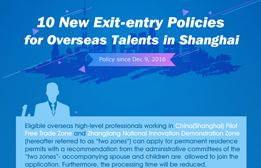Shanghai's demand for talent leads in China
More new graduates choose to work in Shanghai
In addition to mid-to-high-end talent, Shanghai's appeal among new graduates is also increasing. The proportion of graduates from other provinces and cities working in Shanghai has been increasing in recent years, according to the "Report on the Employment Status of College Graduates in Shanghai in 2019" released by the employment promotion center of the Shanghai Municipal Human Resources and Social Security Bureau and the Shanghai Student Affairs Center this year.
In 2019, the number of registered new graduates from other provinces and cities working in Shanghai accounted for 41.67 percent of all students from other provinces and cities, an increase of 2.27 percent over the same period in 2018, according to the report.
The report also showed that Shanghai's appeal among new graduates from the Yangtze River Delta region and East China has been increasing.
According to a survey of 3,518 new graduates in Shanghai conducted by the Shanghai survey team of the National Bureau of Statistics in June this year, among the interviewed non-Shanghai graduates who have signed contracts, the proportion of those who chose to stay in Shanghai for employment reached 75.2 percent, a year-on-year increase of 3.2 percent. Non-Shanghai graduates generally report that the abundance of personal development opportunities, rich urban resources, and high income are the main reasons for choosing to stay in Shanghai for employment.
"Even in a difficult situation like this year, as long as the talents we train meet the development requirements of the city's goal of becoming an international financial center, we don't have to worry about them finding jobs. Some students were even being courted by employers," said Fan Ying, a career consultant working at the career development center of Fanhai International Finance College of Fudan University.
Shanghai provides a friendly environment for all kinds of talent. For example, within three months of its inauguration, the Lingang New Area issued a series of talent policies such as the "Several Measures to Support the Development of Talent in the Lingang New Area of China (Shanghai) Pilot Free Trade Zone", which includes 48 measures in seven major areas, involving the direct settlement of special talent, bonus points for residence permits, housing security, etc.
"Since the deepening of reforms on the household registration system began, Shanghai has indeed faced greater competition from other cities than ever before when it comes to attracting talent," Yang said. Yang also said that the accelerated flow of talent within the Yangtze River Delta region does not mean that Shanghai will lose its advantages in attracting talent.
For example, according to data released by the Zhaopin Big Data and Evergrande Research Institute, Shanghai has consistently ranked first in the talent attractiveness index from 2017 to 2019.
When talking about how Shanghai will consolidate its talent advantages in the future, Yao said: "In addition to cultivating international talent, the global allocation of human resources has become an important way for countries to enhance their competitiveness. Therefore, as one of China's most international cities, Shanghai should also gather talent at all levels from around the world to enhance the international competitiveness of emerging industries."

 Print
Print Mail
Mail




